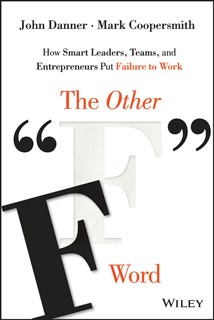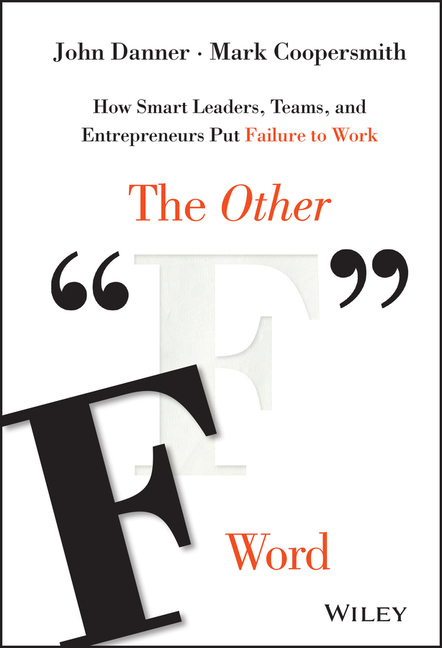The Other "F" Word
March 25, 2015
John Danner and Mark Coopersmith take us on a deep dive into a "largely untapped and misunderstood strategic resource"—failure.
 It is an uncomfortable topic for many, but one we've all experienced and are told we must learn from. The problem is, though there are many good and entertaining books on the topic, there is not one that tells us exactly how to learn from it in a straightforward, systematic way—until now. "It" is failure, a dirty word to many, The Other "F" Word according to John Danner and Mark Coopersmith. But, just like the original "F" word, when used correctly and in the right context, failure can be a really powerful tool. Danner and Coopersmith don't flinch from the topic, and even give us their own "Failure Bona Fides" like a glowing author bio in reverse in the section of the book following the one below.
It is an uncomfortable topic for many, but one we've all experienced and are told we must learn from. The problem is, though there are many good and entertaining books on the topic, there is not one that tells us exactly how to learn from it in a straightforward, systematic way—until now. "It" is failure, a dirty word to many, The Other "F" Word according to John Danner and Mark Coopersmith. But, just like the original "F" word, when used correctly and in the right context, failure can be a really powerful tool. Danner and Coopersmith don't flinch from the topic, and even give us their own "Failure Bona Fides" like a glowing author bio in reverse in the section of the book following the one below.I'll leave that little gem for those of you that want to actually dive into the topic with them, though. For now, here is a piece of the preface from...
A Book About a Topic Nobody Wants to Talk About
Everybody wants to talk about success. But nobody wants to talk about failure. Whether you're an executive, an entrepreneur, or a member of a team in your organization, you'd probably like to improve your odds for success—and are willing to take steps to do that. Plus, you don't want to fail.
In your quest, you can become a more charismatic, inspiring, and effective leader. You can concentrate on creating disruptive innovations that transform your organization or industry. You can develop your skills as a thinker, a listener, a communicator, or a practitioner of your particular job skills.
These are each valuable paths to success. But you are likely sitting on top of a largely untapped and misunderstood strategic resource that can help you get there faster. That resource is failure.
Failure is one resource you and your organization create virtually every day. It's the result of the mistakes you and your colleagues make, the unfortunate results of good faith efforts by hard-working teams, the superiority of your competition or adversaries, or even the bad luck events that upset your organizations' best-laid plans.
Whatever its causes, failure is today's lesson for tomorrow. It contains the secrets that can show you what you still need to know, how you need to change your strategy and, handled wisely, can help you build and maintain an organizational culture that pursues excellence while accommodating fallibility.
Failure isn't just an unfortunate event. It's an everyday reality leaders and teams must address. Managed correctly, it can be a vital resource for resiliency in your career and company. But fear of failure limits most organizations' willingness to take risks, innovate, expand creativity, and fully engage their workforce—thus compromising their chances for success.
We've seen this issue from many different angles. As executives, consultants, speakers, board members, and teachers, both of us have spent decades helping businesses, nonprofits, and government organizations develop strategies, drive innovation, accelerate growth, and strengthen culture. We advise senior management teams at major global enterprises and startup ventures around the world. And we anchor executive education programs, leadership seminars, and keynote conferences on five continents.
We're also fortunate enough to teach leadership, innovation, and entrepreneurship at two of the finest universities in the world, the University of California Berkeley and Princeton. In fact, this book's title comes from a pioneering course called "The Other F Word," which we created at Berkeley's Haas School of Business to help MBA students figure out how to use failure to their advantage.
Why Did We Write This Book?
First, because our audiences, clients, and students asked us to. When we give talks on this topic the most frequent questions we receive are "How can we address this in my company, where failure is not an accepted topic of discussion?" and "What advice can you give me to help get started?" We suspect that, like so many others, you and your organization share this interest. You want ideas and suggestions to improve your odds of success. We will show you how to address failure in a more meaningful, productive way, so you can liberate it from the confines of whispered conversations. Failure benefits no one when it is the unmentioned elephant in the conference room.
Failure is a huge topic that impacts every aspect of business. As executives and advisors, we encounter failure in virtually every major organizational function and level—from the C-suite to the factory floor and from frontline sales teams to back-office support managers. In our work as consultants, we've tackled it firsthand at organizations in different phases in the business life cycle, from early-stage startups to well-established global enterprises. In all these settings, despite their many differences and shared commitment to success, the other F word looms large as a leadership and operational challenge.
We see the other F word in our classrooms, too. In our executive education programs, managers from across the organizational landscape and around the world offer candid examples of their struggles in pursuing their enterprises' innovation imperative while accommodating the fear of failure in their organizational culture.
Finally, we have not seen another book that offers truly practical suggestions for how savvy leaders can turn failure from a regrettable reality into a resource for resiliency. Numerous books and articles exist about failure, from the "I struggled, I persevered, I succeeded" personal memoirs to the "fail fast, fail often" cheerleading of Silicon Valley, and even spiritual and psychological self-help manuals. This book is not one of those. We will offer you specific ideas on what you can do with failure to improve your odds of success.
After all, that's really what we're each looking for, isn't it?
ABOUT THE AUTHORS
John Danner is a management consultant, professor, and entrepreneur. He advises global enterprises and emerging ventures, and anchors international executive education programs. He teaches innovation, entrepreneurship, strategy, and leadership at the University of California Berkeley and Princeton University; and conceived the idea for TED University. A frequent keynote speaker at conferences on five continents, he and his wife live in Berkeley, CA and New York City. Visit www.JohnDanner.com
Mark Coopersmith is a corporate executive, entrepreneur, strategic advisor, and professor. A Senior Fellow at UC Berkeley's Haas School of Business, he teaches innovation, entrepreneurship, and leadership to students and executives from around the world. He has built and run global businesses for Sony and Newell Rubbermaid, has launched successful Silicon Valley startups, and speaks frequently to international audiences. He and his family live in Tiburon, CA. Visit www.MarkCoopersmith.com


